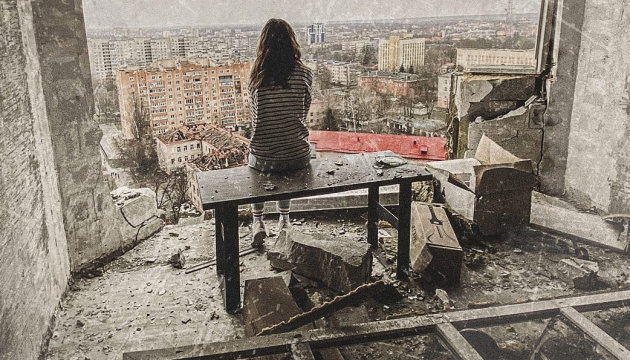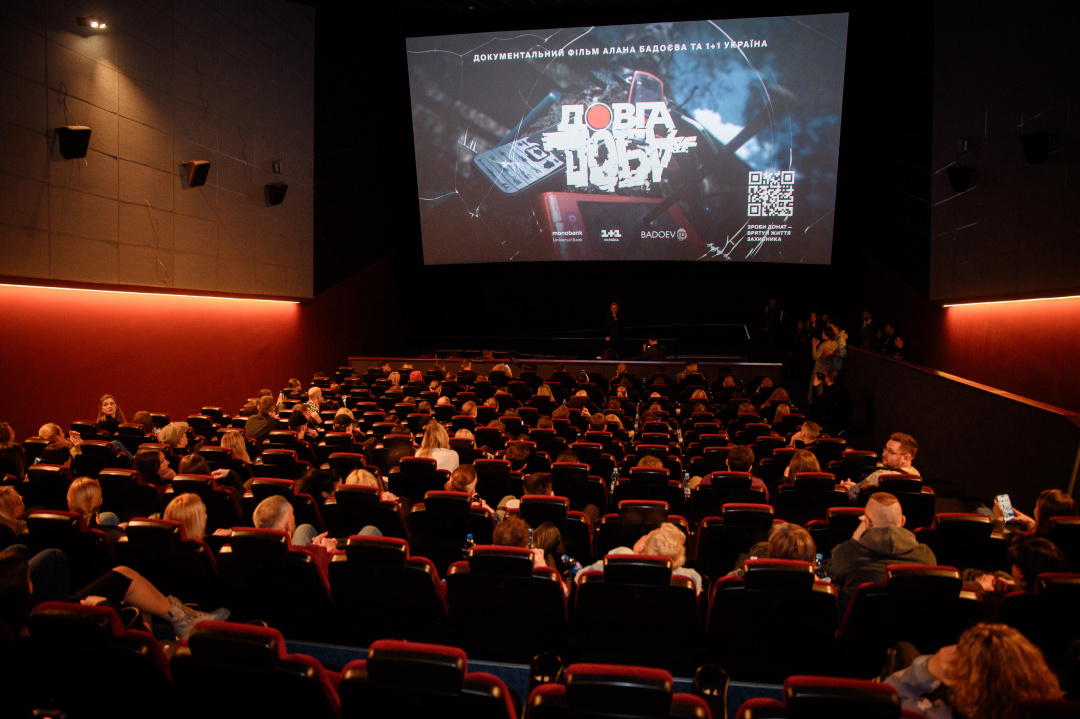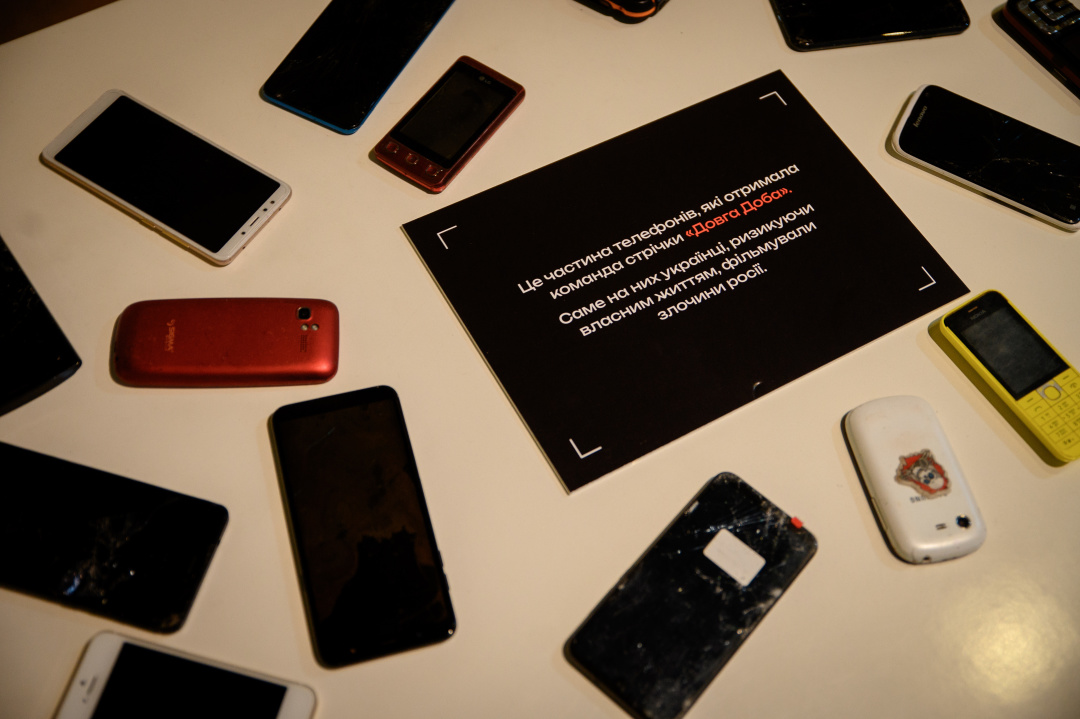
"The Long Day" is movie that Ukrainians made about themselves
Director Alan Badoev tells us how he worked on the film, and we share our impressions of watching the winner of the Cinema for Victory documentary film festival
On the second anniversary of Russia's full-scale invasion, Ukrainian filmmaker Alan Badoev presented the documentary The Long Day. The peculiarity of this film is that it does not have a director of photography - it was shot on their gadgets by ordinary Ukrainians who became co-authors of the film. 12,000 people sent the director videos and photos of their lives divided into "before" and "after" on February 24, 2022.

This is not just the view of one artist or a professional film crew, but the view of thousands of eyes that witnessed the terrible events of the first year of the Great War in various parts of the country, from the largest cities to small villages: Kyiv, Bila Tserkva, Ivankiv, Kharkiv, Mariupol, Kherson, Chernihiv, Dnipro, Maksymivka, Ivanivka, Makarivka, Sloboda, Hostomel, Balovne... The viewer will see everything everywhere and at the same time through the eyes of a mother, a child, a soldier, a young widow, a student, an old woman…

THE PROTAGONIST OF THE FILM IS A COMPOSITE IMAGE - A UKRAINIAN FAMILY THAT LIVED ON THEIR LAND AND WAS ATTACKED BY RUSSIA
Two hours of intense, strikingly strong emotion, complete involvement in the action, the full effect of presence. And tears from the very first frames. These are my personal impressions of The Long Day. Badoev has filigree assembled a coherent picture from two hundred hours of diverse fragments and emotional fragments, built logical storylines, placed accents, and identified the main dramatic directions.
There is no one who leads the plot in the movie - the viewer turns into sight and hearing from the very first seconds, catching everything that happens on the screen. No, not on the screen - in real life around us. It's as if you are close to this movie, it doesn't let go, it echoes in you, it sharpens your emotions, because after all, it happened to you, it's your experience. It is also a record of Russian crimes, the naked truth about the terrible consequences of their aggression, evidence of Russian inhumanity that Ukrainians still face every day. And the following warm and important words are heard in different voices: "why are you crying, mommy...", "hold on", "I love you", "the main thing is not to lose heart", "we will revive and rebuild everything", "we are strong", "we are ready for anything", "we will defeat everyone - we are the people of Ukraine".
There are eight main lines in The Long Day's Work, and their characters are shown in greater detail. But the frank and true stories of all the other characters, who have little screen time and are mentioned in passing, are no less important.
"The protagonist of the film is a composite image - a Ukrainian family that lived on their land and was attacked by Russia. This family feels fear, pain, rage and begins to act. There are losses and victories in the family, and this family does anything to survive and stay on their land. This is the drama I envisioned for myself at the beginning of the work on the film," director Alan Badoev told us in an exclusive conversation about his film.
"MY APARTMENT ON THE THIRD FLOOR... WAS," THE WOMAN SAYS, AND WE FIND OURSELVES IN THE ASHES OF MARIUPOL
"The Long Day begins with peaceful footage: Ukrainians can still laugh carefree, travel, enjoy the sea, surf and ski, take care of the Hollywood smile, celebrate, have children and be confident in their tomorrow. But on February 24, 2022, our endless era begins: explosions, bomb shelters, trials, losses, courage, mutual aid, struggle.
The phrase: "If I don't survive, I'm leaving this record..." is a scary phrase to realize. When a child says this and there are explosions behind him, the pain becomes unbearable. And the Ukrainian kid says it and records it on his phone.
Briefly about the geography of the film:
Chernihiv. A couple in love admires the powdery snow from the window and is sad that it will rain tomorrow morning. But it won't. Tomorrow morning there will be... war. This is the new terrible reality. From now on, we will not be upset by the weather forecast. The house was bombed. "It's a good thing we got out, but there were people in the neighboring apartments," the girl says in despair.
Bila Tserkva. Anna Korzhova receives flowers for her wedding anniversary from her husband Anatoliy, who is defending the country. But a few days before that, she had already received... a funeral notice, and her beloved had ordered the bouquet on the eve of his death.
"My apartment was on the third floor... was," the woman says calmly, and we find ourselves in the ashes of her home in Mariupol.
Emotions of the audience.
Ivankiv. A car in which a father and son were taking their dogs out was shot before our eyes. The explosions. A cry of despair: "Dad, be patient!" and he is patient as long as he can, but he is bleeding because he no longer has a leg. The dog refuses to leave his dead owner, Oleh Bulanenko.
Lysychansk, Sloviansk, Kramatorsk, Avdiivka, Stelmakhivka. We will go there together with volunteer Denys Khrystov to see the eyes of the old people he took out of their bombed-out homes in his bus "Seryoga". And we will hear the calm and the scary: "I'm not going anywhere. I have nothing left. I will stay here. I washed everything so that I could die clean."
In Nova Kakhovka, Tavriysk, Kherson, Bilozerka, we will be among the wonderful people who go to stop the enemy's equipment with the letter "Z" with their bare hands and open hearts. And it will be the Russian invaders who will be pointing their weapons at us. And Kherson photographer Olena Ivanova will take us on a tour of her favorite city, torn apart by Russians: "Tanks in Kherson... We will not give you our city and our country! Kherson is Ukraine!"
Alan Badoev with Olena Ivanova, a photographer from Kherson, the heroine of the film.
Side by side with the commander of the Stugna special forces unit, Dmytro Linko, we find ourselves right where the fierce fighting is taking place - at the front, and we can almost feel the tourniquet on the leg of a seriously wounded soldier and the stern support of his comrades on our skin: "Brother, you are strong, you can do it! Imagine how proud your girlfriend will be of you!"
"Do not memorize our names. We want you to remember or feel our idea" - these words of environmental activist Roman Zhuk, who went to serve as a scout for an artillery platoon of the 128th separate mountain assault brigade of the Transcarpathian Brigade after the full-scale attack began, are heard several times in the film. But we will remember every name. Before the war, Roman and his wife fought for the preservation of our environment, actively organized volunteer environmental campaigns, including a massive cleanup of the Vilshansky Reservoir. He died on May 26, 2022, near Zaporizhzhia.
"No matter what, they will never be able to steal our dreams, our ability to love. We will continue to live, waiting for the time when we will be together again," Olena Zhuk says in the film, declaring her eternal love.
Alan Badoev with Olena Zhuk and her children.
THE FILM LONG DAY IS, IN A WAY, MY ATONEMENT TO MYSELF
Alan Badoev came up with the idea immediately after the discovery of the Bucha tragedy. He says that at that time it both shocked him to the point of unbearability and gave him the impetus to act.
According to the director, after the full-scale invasion, in addition to despair at the terrible events, he also felt disappointed in himself because of his previous collaboration with Russian musicians. So has he managed to restore balance within himself? Or maybe the creation of this documentary helped him overcome his internal crisis and get out of it?
- Yes, it did. Again, a filmmaker most often recreates the topics that bother him, and through them he connects himself with the time in which he creates. That's why the film Long Day is in a way my atonement to myself. I had to go this way, I had to feel pain in order to find myself again.
When making the film, my team and I went the hardest way through real life, very painful stories, in order to remember and leave the pain and courage of Ukraine in history," he says.
The film's core production team consisted of three people: Alan Badoev, author, director and producer; Yana Mazana, second director and editor; and Anna Volodavchyk, editor-in-chief. Communication with the film's subjects was as follows: some files were sent to the 1+1 Ukraine TV channel, people sent the filmmakers a lot of material, and the editor collected some materials manually, visiting the military and people.
Alan Badoev with the characters from the movie "Long Day".
I HAD THE OPPORTUNITY TO MEET THE SURVIVING CHARACTERS AT THE FILM PREMIERE IN KYIV, AND THEY ARE EXTRAORDINARY PEOPLE - BADOEV
Alan tried to follow the rule of a documentary filmmaker - not to talk to the characters as long as he could, in order to be as objective as possible. But somewhere in the end, when clarifications were needed, he got in touch with them. And he had the opportunity to meet with the surviving heroes, whom he considers to be extraordinary people, at the film premiere in Kyiv. "I love them with all my heart and thank them for their trust! We keep in touch, and this connection is for life," the director sincerely admits.
In total, the film took a year and a half to complete. At first, we selected the characters' stories based on the degree of their development and what caught our attention and did not let go. Then we edited each story separately and combined them all in the final, looking for places of common intersection in terms of time, place and meaning.
"This allowed us not just to unite people, but to tell a story with a 360-degree view and, most importantly, to create artistic moves in such a way as to reach the main idea of the whole film," the author shares.
EVERY WORK IS A STATEMENT. IT DOESN'T MATTER WHETHER IT'S A MUSIC VIDEO, A DOCUMENTARY OR A FEATURE FILM
As you know, Badoev is a documentary filmmaker by training, but for a long time his focus has been on music video production, television production, production and directing feature films. I ask him if it is possible that after Long Day's Work, documentary will become the main direction in his future work?
- For me, directing is like the air I breathe. But I have always tried to have no boundaries in genres. Every work is a statement. It doesn't matter whether it's a music video, a documentary or a feature film. Even a TV show, if it is made as a statement, has its own value. I approach directing as an ability to form an opinion and tell a story. And I really like to turn to the genre that allows me to work with the time and content of the event as thoroughly as possible.
I actually studied to be a documentary filmmaker, and this always helps me, even in fiction productions, to be as honest as possible and to explore the time in which the same statement is created. At the moment I am already planning a new work, but it will be fictional, moreover, multimedia.
- The Long Day has added to a rather large array of new Ukrainian documentaries. What is your opinion on the expediency of making feature films about the war now?
- I have a clear position on this! In my opinion, it's too early to make a feature film on war topics. Time has to pass so that it doesn't turn out to be speculative and arrogant. Great films about war have always been made over time.
- What was the most difficult part of working on the film?
- Every day we remembered that we were working with people's lives and even with their end. It's very hard to fall in love with a person and lose them during the timeline.
- Is this film more about the emotional component and reflection on the experience, or can it also teach the viewer something else?
- First of all, this movie is about the lust for life, and this is something we have to learn every day. But it is also about fear, and how to overcome it, about pride, about unity.
- Is it worth showing this movie to children, let's say, teenagers?
- You have to be careful here. Personally, I think that I should extend children's childhood as long as possible. But there will come a time when they will need a movie: to know what the enemy is, what infinite evil is...
24 COMPOSITIONS WERE WRITTEN FOR THE FILM, AS WELL AS 24 HOURS IN A DAY AND THE ENGLISH-LANGUAGE SONG-SOUNDTRACK SOLDIER
"The Long Day won the first Ukrainian national documentary film festival Cinema for Victory, which showcased films made during the war. During the award ceremony, a member of the jury, a well-known Ukrainian cinematographer Serhiy Mykhalchuk, emphasized that Long Day did not have a person of his profession, i.e. a director of photography, because the Ukrainian people themselves acted as the cinematographer, which was unique and had a great impact on the result. The director says that, first of all, it was an honor for him to receive the award from Mikhalchuk and to hear such words. But he always emphasizes that this is not only his work, but his and the characters' joint film.
And while there was no professional director of photography at all, there were several composers in The Long Day's Work. As a man who loves music, it is quite logical that Badoev immediately realized that the film should have a "musical synopsis" that not only enhances emotionality but also widens the accessibility of perception to the widest possible audience. Even a foreign language audience - everyone understands the emotion and the music (although of course the film has English subtitles).
The music was composed by Yevhen Filatov, who wrote 24 compositions, just like the 24 hours in a day. Katya Chili worked alongside him. The music for the first trailer was composed by Yevhen Khmara. And Max Barskih created the English-language song-soundtrack Soldier, which briefly depicts the condition of our heroes and us. "Each of us who is fighting is a soldier and a guardian of our land. Both at home and abroad, people give a standing ovation to this song," the team told us about the feedback from Ukrainians and foreigners who have already watched The Long Day's Work.
A MOVIE IS A TIME CAPSULE, A HISTORICAL DOCUMENT CREATED FOR POSTERITY AND, QUITE POSSIBLY, FOR A COURT IN THE HAGUE
It has already been announced that the film will have a foreign distribution history, and its special screening at NATO Headquarters as part of a strategic meeting in Brussels on the eve of February 24, 2024 is just the beginning of it.
The authors of the film plan to cover a large number of countries and note that the distribution of the film is being done by Ukrainians themselves. "Almost all screenings on all continents are made possible by the movement of our fellow citizens, who independently arrange for broadcasts in each city and connect the team with cinemas. Ambassadors and diplomats also help with the promotion. "And this is just the beginning of the Long Day movement," the filmmakers are sure.
The charitable goal is also important: so far, the film has raised more than UAH 1,100,000 in charitable donations. To this amount, the authors will add a cash prize from the Cinema for Victory National Documentary Film Festival and funds from foreign screenings, and transfer them to help seriously wounded soldiers. "I sincerely believe that we will be able to help at least one soldier with prosthetics and rehabilitation. Because one person is already a life!" says the director.
In conclusion, I would like to add that, based on the title of the film, before I watched it, I thought that it would be videos from the first day of the invasion, but here everything is much broader - a "day" as a period, a "day" that lasted for months.
"The film ends with the phrase 'Our long day continues...'. Because the war continues. And the events in the movie end with the liberation of the right bank of the Kherson region. Because I really wanted to show hope and our achievements. We all need hope for strength and faith. For me, "The Long Day" is the name of what we have been experiencing for the last 2 years, the Ukrainian movement for historical truth. The movie is a time capsule, a historical document created forever for posterity and, quite possibly, for the court in The Hague. We'll see," says Alan Badoev, the director of the documentary.
Let's believe that this is exactly what will happen. Believe and fight. Our long time together continues, but we are strong, we can do anything and we will win.
Lubov Baziv. Kyiv
Photos by Dmytro Komissarenko, courtesy of the Long Day's Work film team.
